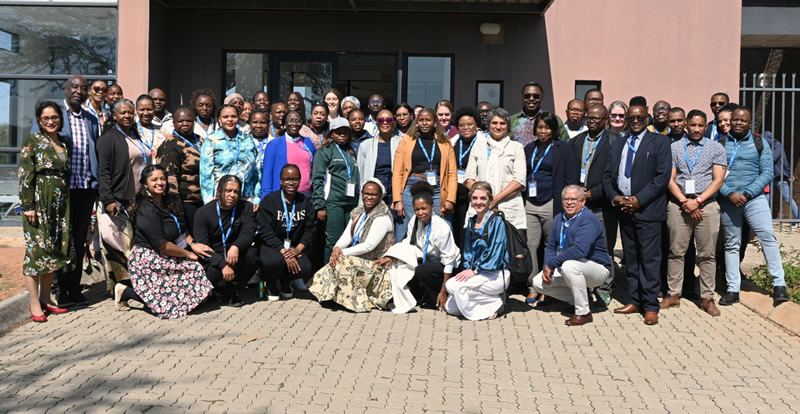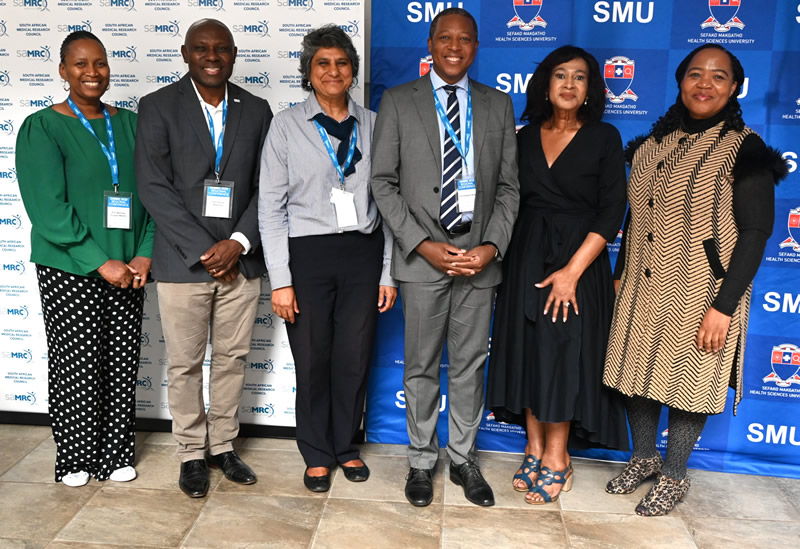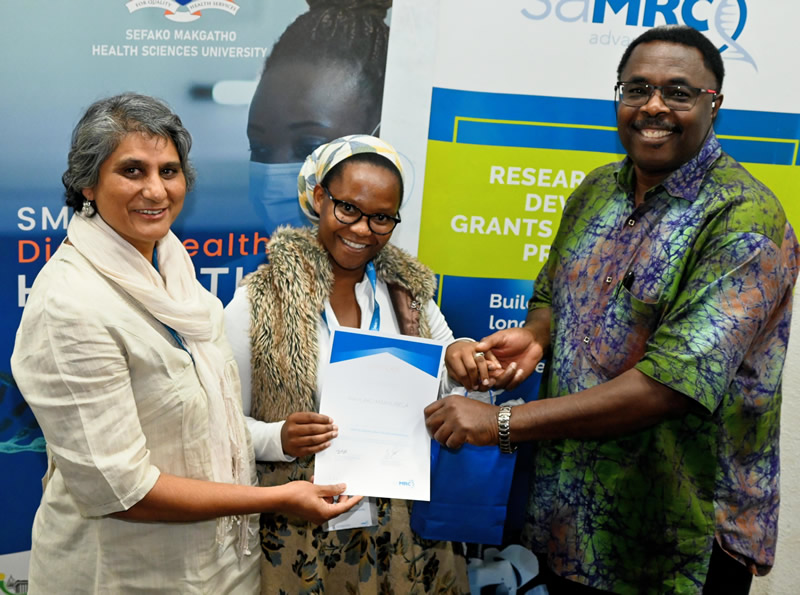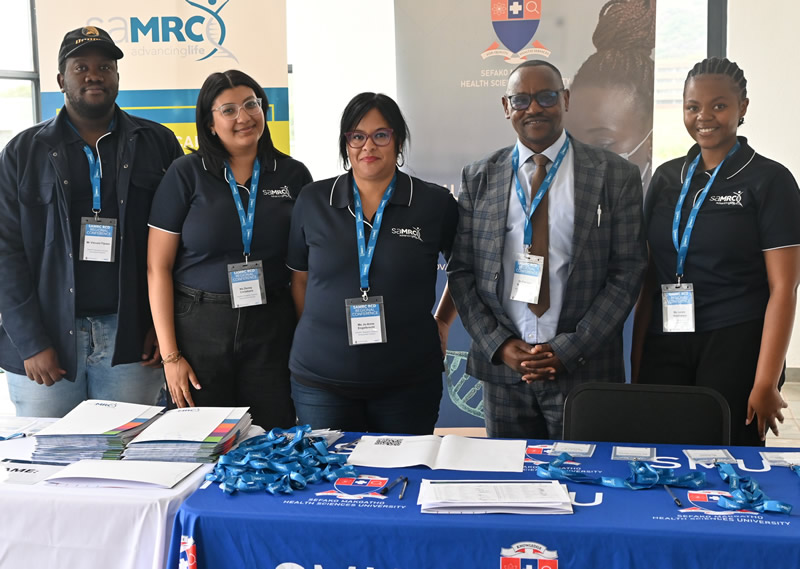The South African Medical Research Council (SAMRC) hosts its second RCD Regional Grant Holders Beneficiary Conference in Gauteng
The South African Medical Research Council (SAMRC), through its Research Capacity Development (RCD) division, hosted its second Regional Grant Holders Beneficiary Conference from 20 to 21 October 2025 in Ga-Rankuwa at Sefako Makgatho Health Sciences University (SMU).

Under the theme of "Funding for Impact: Fostering Capacity Development Partnerships for Innovation Leadership" the conference provided opportunity for RCD beneficiaries to meet with the SAMRC President, present their research, engage in insightful discussions, and connect with peers and experts in their fields, thereby fostering research capacity strengthening through local partnerships and collaboration. Following the first regional conference in KwaZulu Natal Province organized by the University of Zululand last years, this year's event brought together more than 100 emerging, early, and mid-career researchers from eight institutions including from Sefako Makgatho Health Sciences University (SMU), North-West University (NWU), the University of Limpopo (UL), the University of Venda (UNIVEN), the University of Johannesburg (UJ), the University of the Witwatersrand (Wits), the University of Pretoria (UP), and the Tshwane University of Technology (TUT).
Introducing the conference, Dr Abeda Dawood, RCD Divisional Manager, highlighted the importance of regional engagements in advancing South Africa's research ecosystem through progress tracking, programme support, and collaboration across institutions.
Welcoming all the guests and attendees at SMU, Prof Tandi Matsha-Erasmus, SMU Vice-Chancellor, praised SAMRC for choosing SMU as the hosting place of the conference. Prof Matsha-Erasmus noted the conference's alignment with SMU's vision to foster a research culture addressing national health priorities and producing globally competitive scientists.
In his keynote address, Prof Ntobeko Ntusi, SAMRC President and CEO, focused on the evolving global funding landscape and stressed the importance of strong, locally driven innovation systems that can withstand international challenges. In response to the recent funding cuts from the United States, the SAMRC has acted swiftly to safeguard South Africa's vital health research enterprise. Prof Ntusi remarked as SAMRC, "Through collaborative efforts, we are ensuring that critical research, infrastructure, and human capital are protected, and that South Africa's scientific progress continues despite the challenges". He further advised attendees that "It is now high time for all researchers to seize this moment to turn challenge into opportunity—to ensure that South African science not only endures global shifts but thrives through resilience, innovation, and leadership".

From right Dr Thandi Mgwebi (NRF), Prof Tandi Matsha-Erasmus (SMU), Professor Ntobeko Ntusi (SAMRC), Dr Abeda Dawood (SAMRC), Prof Pascal Bessong (UNIVEN) and Dr Mandisa Singata-Madliki (Wits)
The two-day programme featured other keynote addresses by Dr Michelle Mulder, RCD line executive, speakers such as Dr Thandi Mgwebi, Group Executive for Business Advancement at the NRF, Prof Pascal Bessong, Director of the SAMRC-UNIVEN Antimicrobial Resistance and Global Health Research Unit, Prof Keolebogile Motaung FALF/FREF /NMU Research Chair in Entrepreneurship and Financial Inclusion Research Support & Management, Prof Johan Louw, Senior Director SAMRC Platform introduced the Centre for Advanced Training and Innovative Research and Mr Will Rohde, international artificial intelligence expert.
In emphasizing the great impact of the conference, and the collaboration that it represents, Dr Thandi Mgwebi, noted in her address that partnerships allow for leveraging strengths, sharing of resources and great acceleration of innovation that benefits all. Dr Michelle Mulder's talk highlighted innovation and recent global changes in the funding landscapes mostly to highlight how beneficiaries can capitalize on what SAMRC offers to strengthen their capabilities.
Scientific sessions highlighted national priorities, including antimicrobial resistance, HIV prevention, mental health, biomedical innovation, and digital health solutions. Overall, beneficiaries showcased research supported through diverse RCD programmes, including the Research Capacity Development Initiative – Principal Investigator (RCDI-PI) and Nested (RCDI-Nested) programme, Mid-Career Scientist Programme (MCSP), Early Investigators Programme (EIP), and the Extramural Postdoctoral Programme (EMU). The conference featured over 60 oral presentations and 19 posters, reflecting the breadth and impact of these initiatives. Feedback from beneficiaries was overwhelmingly positive. Participants described the conference as well-organized, insightful, and engaging, appreciating the opportunity to network, share research, and learn from diverse sessions.
In addition to beneficiaries, scientific presentation, a variety of talks included local funding opportunities and rating as well as the SAMRC funding processes. In the context of SAMRC RCD, while the RCD scholarships are aimed at supporting master's and PhD studies, the purpose of the RCD grant programmes is to create an opportunity to fast-track and transition early-career and mid-career scientists to independent research leaders.
Another highlight was the awards for oral and poster presentations for MSc and PhD students working on funded projects. One of the assessors highlighted that the presentation and content of the sciences were excellent, and that students had really done very well. Five best oral presentations got the prizes. Ms Mahlako Makhubela from SMU won first best oral presentation for her current project, "Towards establishing a framework on decolonizing activity selection training in the occupational therapy curricula in the South African context".

Ms Mahlako Makhubela (PhD student) receiving the Certificate for the best oral presentation
Three best poster presentations also received the prize. Ms Phatho Ramantswana won the first best poster presentation, titled "Mushroom Cultivation as a Tool for Rural Development in South Africa" from TUT.
The event was chaired by Prof Nwabisa Shai (Unit Director of the SAMRC Gender and Health Research Unit), and Prof Obi (Dean of the Faculty of Science and Technology, SMU) Concluding the event, Prof Nwabisa praised participants for their commitment to collaboration and for demonstrating leadership in strengthening research capacity.

RDC Team during the registration
Commenting on the overall conference, Dr Abeda Dawood thanked the RCD team and SMU colleagues for organizing the conference: "the conference has successfully allowed beneficiaries to meet at a historically disadvantaged institution and actively chat with their peer about partnerships to drive scientific excellence and innovation. This reflects the conference's overarching goal of building a resilient, collaborative research community”.
The next conference will be in Eastern Cape Province.

